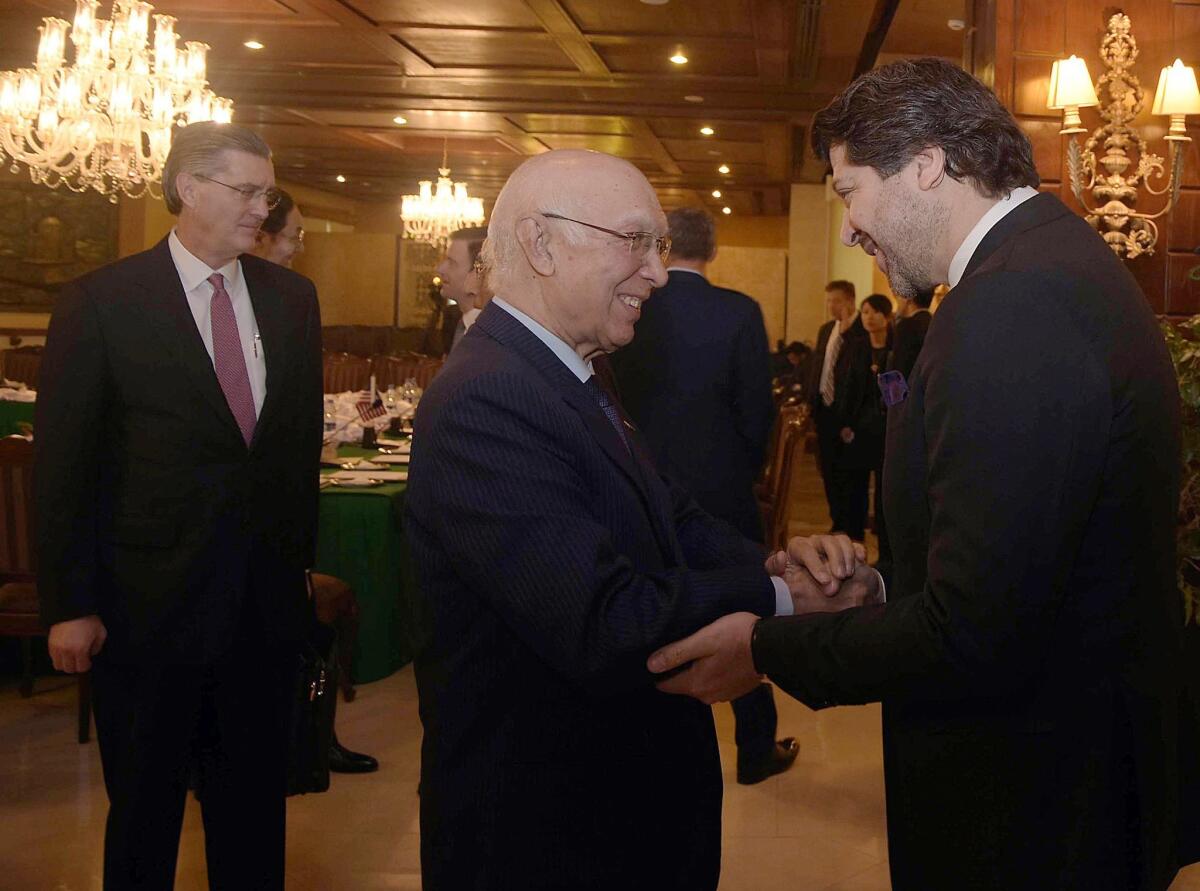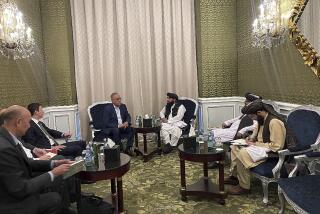Four nations, including U.S., try to jump-start peace talks in Afghanistan

Pakistani national security advisor Sartaj Aziz, center, exchange greetings with Afghan Deputy Foreign Minister Hekmat Karzai at a meeting in Islamabad, Pakistan. Also attending the talks is U.S. envoy Richard G. Olson, left.
Reporting from Islamabad, Pakistan â Six months after Afghanistan peace talks broke down, a four-nation meeting on Monday marked the start of a new push to negotiate a truce to end the fighting in the country.
The daylong meeting in Islamabad, the Pakistani capital, was attended by top Afghan and Pakistani Foreign Ministry officials and special envoys from the United States and China but not representatives from the Taliban insurgency.
Although face-to-face talks between the Afghan government and Taliban leaders still appeared to be a long way off, the four parties said they would reconvene next week in Kabul, the Afghan capital, showing a renewed sense of urgency amid mounting violence by Taliban-allied militants.
âThe participants emphasized the immediate need for direct talks between representatives of the government of Afghanistan and representatives from Taliban groups in a peace process that aims to preserve Afghanistanâs unity, sovereignty and territorial integrity,â the four countries said in a statement after the meeting.
Afghanistan says it has received assurances that Pakistan â long accused of harboring insurgents who oppose the Kabul government â will provide a list of Taliban leaders who are willing to participate in talks. Islamabad has also agreed to take action against Taliban leaders who refuse to take part in negotiations, according to Afghan government officials.
But Pakistani Foreign Ministry officials said they urged Afghanistan to not demand concessions from Taliban leaders before beginning talks, and said that threats of violence against Taliban holdouts at this stage would be âcounterproductive.â
âThe primary objective of the reconciliation process is to create conditions to bring the Taliban groups to the negotiation table and offer them incentives that can persuade them to move away from using violence as a tool for pursuing political goals,â Sartaj Aziz, the Pakistani prime ministerâs chief foreign affairs advisor, told the gathering.
Pakistan had proposed that the U.S. and its allies halt military action against the Taliban, and that the militants cease hostilities against coalition forces, to build confidence ahead of possible talks, said a senior Foreign Ministry official who was not authorized to speak to the media.
Those proposals seemed unlikely to be heeded as the coalition forces and the Taliban remained locked in a tug of war over territory in several parts of Afghanistan, chiefly the southern province of Helmand. U.S. special operations forces deployed to Helmand last month to help Afghan troops try to win back territory seized by the insurgents.
One U.S. soldier died in the fighting last week, and Afghan forces and militants have also suffered unknown numbers of casualties.
Given the leverage that Pakistanâs security establishment is believed to hold over the Taliban, U.S. officials believe that Islamabadâs participation makes this the best chance at starting talks to end more than 14 years of war.
The Obama administration, which had grown exasperated with Pakistan because of doubts about its pledges to crack down on militants carrying out cross-border attacks against Afghan and U.S. targets, has recently praised Prime Minister Nawaz Sharifâs government for its actions on counter-terrorism.
âWe believe Pakistan will be the key to facilitating a peace process with the Taliban, and we hope Pakistan will follow through on its stated commitment to Afghan-owned, Afghan-led reconciliation,â the Obama administrationâs special envoy to the region, Richard G. Olson, told a congressional panel last month.
Pakistanâs attempt to broker talks began in July with a meeting between Afghan officials and Taliban representatives outside Islamabad, the first time the two sides had met face to face. But days later, the diplomacy collapsed after the Taliban announced that its longtime leader, Mullah Mohammad Omar, had died two years earlier.
The announcement raised the question of whether Taliban leaders and fighters were united in their willingness to enter talks, particularly as Afghanistanâs government shows signs of faltering.
Omarâs successor, Mullah Akhtar Mohammad Mansoor, is believed to support negotiations with Kabul but faces deep internal divisions. Many commanders vow to keep fighting, while others have defected and pledged allegiance to Islamic State, the militant group based in Iraq and Syria.
This peace bid also has the support of China, a close ally of Islamabad that is increasingly worried about the spread of militant Islam along its western border. U.S. and Afghan officials hope Chinese security concerns, as well as its economic interests in South Asia, will prompt Beijing to raise pressure on Pakistan to bring Taliban leaders to the negotiating table.
Pakistani officials have repeatedly played down their leverage over the Taliban.
âThe [peace] process has to be Afghan-led and Afghan-owned as an externally imposed settlement is neither desirable nor it would be sustainable,â Aziz said. âThe role of Pakistan, China and the United States is basically to facilitate the process.â
Special correspondent Sahi reported from Islamabad and Times staff writer Bengali from Mumbai, India.
Twitter: @SBengali
More to Read
Sign up for Essential California
The most important California stories and recommendations in your inbox every morning.
You may occasionally receive promotional content from the Los Angeles Times.











